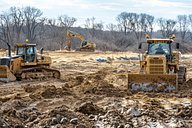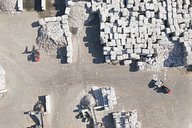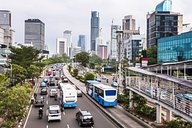Businesses looking for effective, reliable fire protection need proven fire suppression systems and a supplier they can trust. Ardent designs, supplies, installs, and maintains fire suppression systems for high-risk industries, delivering protection that performs in real operating conditions.
Our fire suppression specialists work in partnership with customers across the full system lifecycle-supporting safe, compliant decision-making through clear technical guidance, dependable service, and long-term support. This approach helps protect people, critical assets, and operational continuity.
Why install fire suppression systems?
Reliable fire suppression systems can help businesses protect their personnel, assets, and profitability. Some of their key benefits include:
- Protecting personnel and the general public. Automatic fire suppression systems can detect and control a fire in its early stages without human intervention, keeping personnel safe and allowing them to stay away from the fire. For industries operating heavy mobile plant, on-board fire suppression systems can buy equipment operators valuable time and allow a safe space from elevated cabs. Fire suppression systems installed to public transport vehicles such as buses can also allow for a safe evacuation of passengers and the driver in the event of a fire.
- Minimising downtime and production losses. Fires can not only result in significant repair and replacement costs, but they can lead to downtime and disruption to operations, affecting production and profitability. When combined with a dependable and highly responsive service and support, fire suppression systems help minimise downtime and keep production levels up.
- Protecting business assets and premises. Fire suppression systems installed in mobile plant and equipment can help minimise the risk of a fire spreading within the site and to nearing stockpiles.
- Protecting business reputation and avoiding expensive fines. The effects of fire can go beyond production losses, leading to fines, sanctions, and damage to business reputation. For instance, fires in waste and recycling facilities can have a high-profile, with intervention from local authorities and the Environmental Agency to ensure appropriate measures are taken to reduce the likelihood and impact of fires.
- Lowering insurance costs. Some fire suppression systems are recognised by major insurance providers, which can help lower insurance premiums.
How do fire suppression systems work?
Fire suppression systems control or prevent a fire from spreading by delivering a fire suppression agent (such as water, fire-fighting foam, or chemical agent). These systems are a form of active fire protection, usually triggered automatically by a detection system.
The type of detection method, suppressing agent, and delivery system used by fire suppression systems depends on the specific application and the fire risks involved. A fire hazard analysis of the asset to be protected, as well as its working conditions and operating environment, should be carried out in advance. This will inform a fire suppression system’s design, which detection method and extinguishing agent will be used, and system installation parameters.
The main components of fire suppression systems include:
- A detection system that provides automatic fire detection - smoke, flame, and heat detection are the three more commonly used types of detectors.
- A control module that receives the information relayed by the detection system and sends a signal to activate the system. Some control modules include options for the operator to delay the system discharge, activate the system manually, or put the system in isolation mode to carry out maintenance.
- An actuation system operated manually and/or automatically - we recommend the use of automatic fire suppression systems with additional manual activation point(s) for an extra layer of protection.
- Suppression agent tanks to store the fire suppression agent - some fire suppression system manufacturers offer a wide variety of agent tank sizes to fit every application. Ardent lay-flat tanks allow for flexibility in system design and installation when space is limited, such as small mobile plant and buses.
- An agent distribution network which delivers the agent from the tank to the fire hazard areas, usually discharging the agent through fixed nozzles (indirect systems) or directly from the point of rupture in the discharge tube (direct systems).
Automatic fire suppression systems from Ardent
With a choice of fire detection and suppression technologies, as well as suppression agents, we use our decades of experience to provide the perfect solution for each application.
At Ardent, we are mobile plant fire suppression specialists. From forklift trucks to 1,000-tonne excavators, we help businesses to protect their people and mobile equipment against the risk of fire.
Ardent static equipment fire suppression systems are designed to offer reliable, cost-effective, and low-maintenance solutions to protect essential equipment, such as electrical panels and transformer cabinets.

Heavy Mobile Plant
From trucks to excavators, active fire protection systems protect all large machine types and sizes.

Light Mobile Plant
Our reliably active fire protection systems can react to fires in forklifts and other small plant in seconds.

Bus & Coach
Active fire protection systems to safeguard buses, coaches, people and public transport operations.
Got a question about fire suppression systems?
Request a callbackRelated Content

Telematics
Ardent’s remote monitoring solutions provide real-time visibility of system status, performance, and critical events across vehicles and assets. By enabling proactive monitoring, early fault detection, and data-led maintenance planning, our systems help customers reduce risk, improve uptime, and support safer, more reliable operations.

Servicing & Maintenance
Regular fire suppression system servicing and maintenance is critical to ensure long-lasting protection. Discover Ardent's service plans and callouts.

Training & Support
Ardent has a dedicated training team that works with operators, maintainers, and customers to deliver practical training across our full product range. Our programmes are designed to support safe operation, correct system use, and long-term reliability - helping customers build confidence, competence, and compliance in real working environments.

